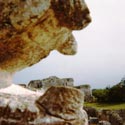Autobiographical essays
I chose this particular title because my creative journey has been as unconventional and daunting as trying to navigate a river in a canoe made of grass.
That I made it this far is something of a miracle.

I chose this particular title because my creative journey has been as unconventional and daunting as trying to navigate a river in a canoe made of grass.
That I made it this far is something of a miracle.

This introductory essay describes my forty-year journey (so far) of question-asking and creativity. It begins with a snapshot I took of a Mayan ruin during a trip to Mexico when I was thirteen years old, a trip that lit a fire that has never gone out.
“Tula changed everything. Something woke up inside of me among the stony statues – something that has not slumbered since. Here’s what I wrote in a little journal I kept: “We arrived in Tula via a very bad and rough road. I thought Tula would be just one temple with some statues on top, but I was wrong. There was the temple, but as we fanned out, there were long ditches with walls and the walls had engravings all over them. We got to the top of the temple. You could see another big mound nearby partly excavated. I took six pictures. I walked over to the top of the unexcavated pyramid.” No one else went with me to this pyramid, probably because it was out-of-bounds. Either I didn’t notice or didn’t care – I had my heart set on exploration. I prowled the pyramid excitedly until one of the chaperones came rushing over to fetch me, this time exasperation etched on her face. “What was I doing?” she asked irritably. “Who did I think I was?”
“Questions I’m still trying to answer to this day.”

This essay, adapted from two published in The Age of Consequences, explores the idea of manifest destiny and my hometown, Phoenix. A sense of exceptionalism and lack of restraint infected Phoenix – and had a huge impact on my life growing up.
“Progress was good for my parents. They came to a strange land as poor pioneers and prospered along with Phoenix. They lived the American Dream – not the pursuit of material success as much as their steady improvement over time. Their lives were better than their parents’ lives. They had more security, more opportunity, more comfort. They didn’t do without, go hungry, or stand in unemployment lines; they were well-educated, well-fed, and well-blessed with the fruits of an expanding economy. For them, the future was always bright.
“I developed a different perspective. I came of age during the heyday of progress, witnessing the good, the bad, and the ugly. Impressed at first, I have lived long enough to see that manifest destiny was not necessarily a positive force in our long history. I will likely live long enough to see evidence that America is not exceptional after all – that despite this nation’s many admirable qualities it is subject to the same historical forces that have worn down all great nations and empires throughout the ages. I know that I’ve already lived long enough to see us enter the Age of Consequences.”

View the PDF